Bangladesh floods: 'I have nothing left except my life'
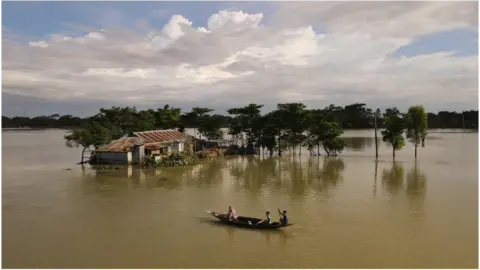 BBC
BBCDozens of people have died, many of them young children, in the worst floods north-east Bangladesh has seen in more than a century. More than four million people have been left stranded.
Shumana Akhter Aisha's home is surrounded by a blanket of water, on a newly-formed makeshift island.
The corrugated iron sheets which form the walls of the structure have been battered by the heavy rain. They hang twisted, as if they've been peeled away from a tin can.
Her home in the Sylhet region may have survived the area's worst rains in living memory, but her husband Goya and sister Lubna didn't.
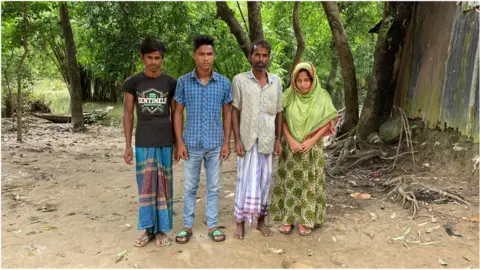
It was after days of incessant downpour that the family, trapped in their home, decided to venture out to find food and safer land.
"The water was sweeping away everything. It was raining heavily along with thunder," Shumana told the BBC.
Despite the weather, she managed to find a boat, but as she and five other relatives travelled out on it, it hit a strong current as Goya was rowing.
"Our boat was filled with water. We weren't able to steer it with our hands. Then I fell into the water and lost consciousness.
"My sister fell in too. So did my husband."
Shumana doesn't know how she survived - a boat rescued her and the other passengers an hour later.
The bodies of Goya and Lubna were recovered after that.
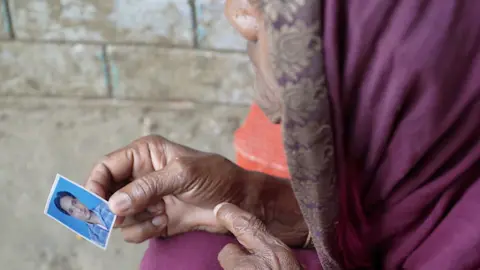
More than 80 people have been killed in floods in Bangladesh since mid-May, most of them in the north-east.
Back at their home now, the only picture Shumana has of 35-year-old Goya is a small passport photo of him.
With hundreds of villages in Sylhet still submerged, days after flash floods hit this region, the stories of misery are everywhere.
Khudeza Begum, 50, was standing on her bed in Companiganj district, when the waters started to rise.
The mother of seven, who lost her husband to cancer, says she gathered her kitchen utensils and clothes onto the bed as she tried to save what she could.
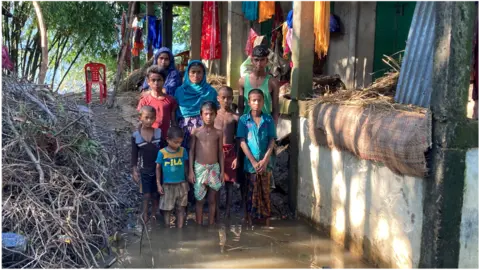
As the water level rose to her chest, she too tried to escape by boat with her family.
"As we were travelling, it capsized. My children and I survived by swimming and holding onto a tree."
Khudeza has her family, but little else.
"I couldn't save my rice or my duck, chicken, cow or goat. They were all drowned. I have to say, I have nothing left except my life."
Khudeza's family is one of millions now left homeless in Bangladesh.
The South Asian nation is no stranger to heavy rains - every year families in this part of the world ready themselves for the annual monsoon season.
But this year Sylhet has seen its highest rainfall in more than a century.
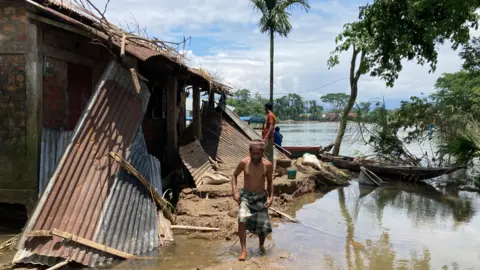
Sylhet usually gets around 840mm of rain in June, according to the country's Flood Forecasting and Warning Centre. But even before this month is out, it's received nearly double that - more than 1,500mm.
It's predicted that erratic weather patterns could become a more regular occurrence in Bangladesh, one of the most world's most climate vulnerable nations.
A 2015 analysis by the World Bank Institute estimates about 3.5 million Bangladeshis are at risk of river flooding every year.
One report cited by the UN estimates that by 2050, 17% of the country will be submerged by rising sea levels, leaving 20 million people without a home.
In this latest wave of torrential weather many already are.
"Most houses here remain under water. People need food, they need water, they need clothes," Lt Col Abdullah, from the Bangladesh Army, told the BBC.
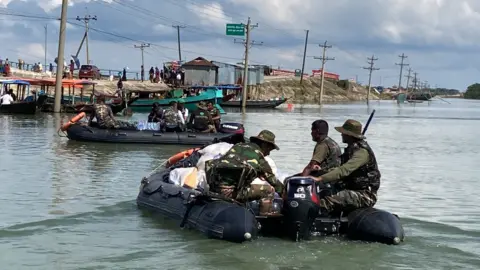
Lt Col Abdullah is helping co-ordinate relief efforts in Companiganj.
"Some of these people stayed four or five days on the roof [of their submerged homes]. And then we rescued them."
He says the biggest difficulty his team faces is getting to people in remote areas.
"They are unable to reach out to us, and we don't have that information. If we have that information, we can go and rescue them."
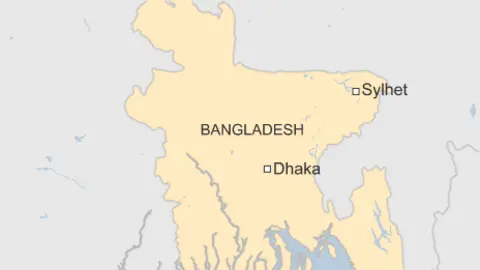
And once people are rescued, other challenges persist - the risk of water borne diseases, hunger and the challenge of rehousing people.
The United Nations Children's Fund, Unicef says the situation caused by the flash floods in Bangladesh has deteriorated rapidly in the last week. It's calling for international help as millions of families are without the basics like drinking water.
For families who are still stranded, the misery is endless.
Boshir Miah Choudhury, a rickshaw driver, has been forced to stay on the rooftop of a local market, after his house was deluged.
"There is a problem with everything. I cannot stay in my house; the water is up to waist level. There is no drinkable water. I am surviving with my children but we are helpless.
"Where will I go? Only Allah knows."
Additional reporting by Salman Saeed
